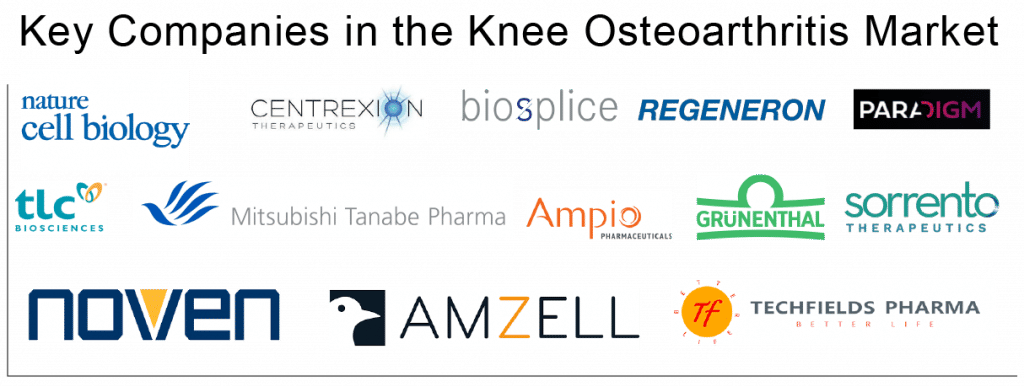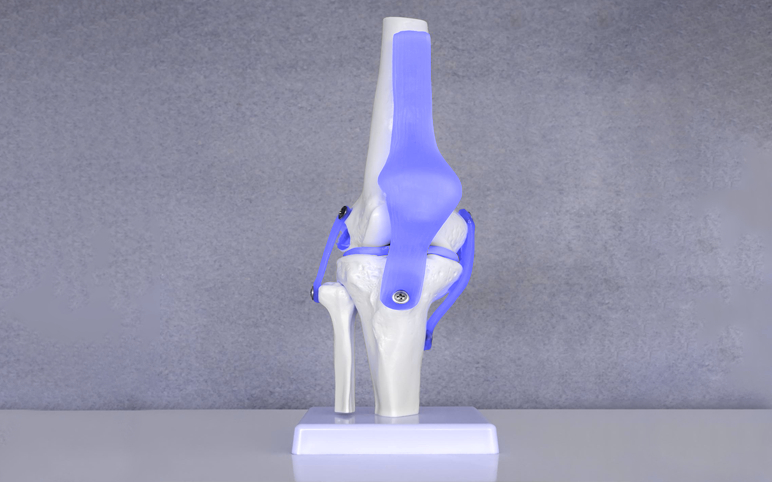Knee Osteoarthritis Pipeline: Stepping Up to Get Bigger and Broader
Apr 22, 2022
While analyzing why the Knee Osteoarthritis market seems lucrative, one factor is easily discernible. Knee Osteoarthritis is quite a prevalent condition and constitutes a massive patient share. Delveinsight estimates, there were approximately 45 million Knee Osteoarthritis diagnosed patients in 7MM in 2021.
However, one may oversee the significant number of late-stage emerging therapies in the Knee Osteoarthritis pipeline, which are expected to enter the market soon and add to the cornucopia of available Knee Osteoarthritis treatments. The emerging Knee Osteoarthritis pipeline is robust and holds the potential to reap benefits for both patients and the companies. . The current Osteoarthritis market comprises opioids, NSAIDs, corticosteroids, and hyaluronic acid, where opioids dominate the market. In the past few years, many intra-articular-hyaluronic acids (IA-HA) have been approved, such as Durolane, Gelsyn-3, Cingal, and Joyclu (combination with steroid), for patients who have failed to respond adequately to conservative nonpharmacologic therapy and simple analgesics, e.g. acetaminophen.
Is the Market Shifting Toward Single IA-HA Injections?
We expect the IA-HA therapies to be used predominantly after oral analgesics and steroid injections no longer provide adequate pain relief. As per Delveinsight’s estimates, in 2021, the combined market size of multiple and single IA-HA injections had exceeded USD 1.7 billion in revenue in the 7MM, even though Japan has yet to witness the launch of a single IA-HA injection.
Downloads
Click Here To Get the Article in PDF

Multiple IA-HA injections are vying for the top spot. However, we anticipate the HA viscosupplementation therapies that require 3 or 5 injections to face competition from single injection therapies, as most of the multiple frequency injections are effective for 4–6 months only, which creates a need for re-administration or repetition of the multiple-dose cycle twice or thrice in a year.
Joyclu’s Approval in Japan
Seikagaku’s Joyclu is a formulation in which hyaluronic acid and diclofenac are chemically bound using Seikagaku’s proprietary technology. In March 2021, Seikagaku obtained manufacturing and marketing approval in Japan based on the results of three Phase III Knee Osteoarthritis clinical studies conducted with Joyclu (SI-613) in Japan. The company is considering a Phase III study while selecting a sales partner in the US, and as per our analysis, we expect the launch of Joyclu in the US market by 2025.
The Scenario of Emerging therapies:
The Knee Osteoarthritis pipeline is robust with key Knee Osteoarthritis players such as Techfields Pharma (X0002), Taiwan Liposome Company (TLC599), Centrexion Therapeutics (CNTX-4975), Biosplice Therapeutics (lorecivivint), Regeneron Pharmaceuticals and Mitsubishi Tanabe Pharma (fasinumab), Ampio Pharmaceuticals (Ampion), Paradigm Biopharmaceuticals (Zilosul), Grünenthal GmbH/Sorrento Therapeutics (Resiniferatoxin), and Nature Cell (JointStem), are evaluating their lead candidates in different stages of clinical development. A few of the potential therapies in the Knee Osteoarthritis pipeline have been discussed below:
First Mover Advantage
Centrexion Therapeutics’ CNTX-4975 (TRPV1 receptor agonist) is an ultra-pure, synthetic form of trans-capsaicin injected directly into the site of pain. According to Phase III data, CNTX-4975 was well tolerable at all Osteoarthritis trial doses. And to expedite the approval process, the drug has received Fast Track Designation. With a high probability of entering the US market in 2022, we expect CNTX-4975, out of all symptomatic emerging Knee Osteoarthritis therapies, to thwart its competition and capture a revenue of USD 700 million by 2032. In addition, resiniferatoxin (RTX) – another TRPV1 receptor agonist, being developed by Sorrento Therapeutics is also in the Knee Osteoarthritis pipeline.
Moving Towards a Promising Future: Entry of Stem Cell Therapies
Interestingly, the Knee Osteoarthritis market is expected to witness the entry of disease-modifying therapies as the current market only comprises symptomatic Knee Osteoarthritis treatment. The development of stem cell Knee Osteoarthritis therapies under the disease-modifying segment could also be a game-changer for Knee Osteoarthritis patients. IA injection cell therapies include Nature Cell’s Jointstem, which is expected to launch the earliest compared with Medipost’s Cartistem and Kolon TissueGene’s Invossa.
- JointStem is the world’s first stem cell therapy for patients with severe Knee Osteoarthritis. Unlike other Knee Osteoarthritis therapies, JointStem does not require repetitive injections periodically, which we believe can help JointStem stand out in the crowd to become the only curative treatment. It is a cartilage replacement therapy, and we expect it to capture a larger Knee Osteoarthritis therapeutics market share due to its first-mover advantage in the United States in 2023.
- Medipost’s Cartistem is already approved in Korea since 2012; based on Korean trial results, the company is now planning to evaluate the Knee Osteoarthritis trial in the US.
- Kolon TissueGene’s Invossa is planning to seek a disease-modifying osteoarthritis drug (DMOAD) designation for the drug; if granted, it can gain the benefits of premium pricing for its therapy.
Together, we estimate these three cell therapies to generate a combined revenue of approximately USD 2 billion by 2032.
Would the unsatisfactory results of Regeneron’s and Mitsubishi’s fasinumab – all set to launch in Japan by 2023 – become an impediment to its US launch?
There is currently no monoclonal antibody approved for the treatment of Knee Osteoarthritis. We hoped for the FDA approval of Pfizer’s tanezumab last year, but it was rejected due to uncertainties about the drug’s benefits versus risks profile. Only one monoclonal antibody is in Phase III in the current Knee Osteoarthritis pipeline. We see a similar pattern with Regeneron’s fasinumab because its Phase III results have been unsatisfactory; however, we have to wait for the company’s next move in terms of the drug’s future. It is a nerve growth factor (NGF) inhibitor, the class which the US FDA previously put down due to safety concerns. Regeneron is developing Fasinumab with Mitsubishi in Japan. However, as planned in Japan, Mitsubishi is gearing up for a launch in 2023.
Zilosul: Wannabe Blockbuster Therapy?
Paradigm Biopharma is quite optimistic about its Pentosan polysulfate (PPS), Zilosul injection. We believe that, given long-term efficacy and stable safety data, Zilosul will add significant value to the treatment of Knee Osteoarthritis by addressing certain critical unmet needs. Furthermore, if the company receives a disease-modifying osteoarthritis drug (DMOAD) designation, the drug will be eligible for a premium pricing, increasing the overall revenue of the product. However, as per our estimates, even if the drug does not receive DMOAD designation and conservative pricing, the drug is expected to achieve approximately USD 850 million by 2032 in the 7MM.
Did Merck conduct the most extended Phase II DMOAD study ever? Has it been a smooth ride for AKL Research and Development and Taiwan Liposome Company in their efforts to bring novel therapies to the market?
- Merck is developing a recombinant human fibroblast growth factor 18 (rhFGF18) known as sprifermin (AS-902330) for the treatment of Knee Osteoarthritis. Merck conducted the longest DMOAD study ever reported in Phase II study and maintained long-term structural modification of articular cartilage versus placebo in a 3.5-year treatment-free period.
- APPA is a unique combination of two synthetically produced isomers, 4-hydroxy-3-methoxyacetophenone (4H3MA) and 2-hydroxy-4-methoxyacetophenone (2H4MA) drug developed by AKL Research and Development. It is an investigational NFkB and Nrf2 modulator. We are expecting the launch of APPA by 2025 in the US.
- Taiwan Liposome Company’s TLC599 is IA corticosteroids that contain dexamethasone sodium phosphate. TLC599 has the potential to reduce the need for oral medication use in a setting where opioids are frequently used for pain control. We expect the US launch of TLC599 by 2023 and project it to garner a market revenue of USD 420 million by 2032.
Apart from upcoming unique mechanisms, the Knee Osteoarthritis market is also expected to witness a surge in better versions of NSAIDs that out of all emerging Knee Osteoarthritis drugs are expected to capture a Knee Osteoarthritis therapeutics market share of approximately 10% in 2032; these majorly include X0002 (Techfields Pharma), HP-5000 (Noven Pharmaceuticals), and AMZ-001 (Amzell).

Frequently Asked Questions (FAQs)
Knee Osteoarthritis is defined by the degradation of the knee’s articular cartilage—the flexible, slippery material that ordinarily shields bones from joint friction and impact. The condition also involves alterations to the bone beneath the cartilage and might impact surrounding soft tissues.
Osteoarthritis symptoms frequently appear gradually and worsen with time. Among the signs and symptoms of Knee Osteoarthritis are pain, stiffness, tenderness, loss of flexibility, grating sensation, bone spurs, and swelling.
The basic goal of Knee Osteoarthritis treatment is to reduce pain and restore mobility. Typically, the treatment regimen will involve weight loss, exercise, alternative therapies, anti-imflammatory drugs, surgery, and others.
The Knee Osteoarthritis pipeline is robust with emerging therapies such as X0002, TLC599, CNTX-4975, lorecivivint, fasinumab, Ampion, Zilosul, Resiniferatoxin, JointStem, and others.
Leading Knee Osteoarthritis companies such as Techfields Pharma, Taiwan Liposome Company, Centrexion Therapeutics, Biosplice Therapeutics, Regeneron Pharmaceuticals, Mitsubishi Tanabe Pharma, Ampio Pharmaceuticals, Paradigm Biopharmaceuticals, Grünenthal GmbH, Sorrento Therapeutics, Nature Cell, and others are evaluating their lead candidates in different stages of clinical development to improve the Knee Osteoarthritis therapeutics landscape.
Downloads
Article in PDF



